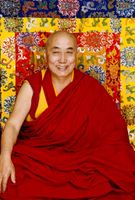Loden, Thubten: Difference between revisions
TracyJoosten (talk | contribs) No edit summary |
m (Text replacement - "{{Footer}}" to "") |
||
| (8 intermediate revisions by 3 users not shown) | |||
| Line 1: | Line 1: | ||
{{Person | {{Person | ||
|HasDrlPage=Yes | |||
|HasLibPage=Yes | |||
|HasBnwPage=Yes | |||
|pagename=Loden, Thubten | |pagename=Loden, Thubten | ||
|PersonType=Geshes; Tibetan Buddhist Teachers | |PersonType=Geshes; Tibetan Buddhist Teachers | ||
|images=File:Geshe Loden Thupten.jpg | |images=File:Geshe Loden Thupten.jpg | ||
|namefirst=Thubten | |namefirst=Thubten | ||
|namelast=Loden | |namelast=Loden | ||
|nameprefix=Geshe Acharya | |nameprefix=Geshe Acharya | ||
|bio=Born in 1924, Geshe Loden became a monk at seven years old. After completing extensive Buddhist philosophy studies, he received the Geshe Lharampa degree from Sera Je Monastery in Tibet, and an Acharya degree from Varanasi's Sanskrit university in India. He was also awarded a Master's qualification in Vajrayana Buddhism after many years study at Gyudmed Tantric College. Geshe Loden originally came to Australia in 1976 at the invitation of Lama Thubten Yeshe to be the resident teacher at Chenrezig Institute, Queensland, where he remained for three years before leaving to start his own organization.<br> Geshe Loden has written many books on Tibetan Buddhism, including: ''Great Treasury of Mahamudra'' (2009); ''Essence of the Path to Enlightenment'' (1997); ''Meditations on the Path to Enlightenment'' (1996); ''The Fundamental Potential for Enlightenment'' (1996); and ''Path to Enlightenment in Tibetan Buddhism'' (1993). ([https://en.wikipedia.org/wiki/Geshe_Acharya_Thubten_Loden Source Accessed Jul 27, 2020]) | |||
|bio=Born in 1924, Geshe Loden became a monk at seven years old. After completing extensive Buddhist philosophy studies, he received the Geshe Lharampa degree from Sera Je Monastery in Tibet, and an Acharya degree from Varanasi's Sanskrit university in India. He was also awarded a Master's qualification in Vajrayana Buddhism after many years study at Gyudmed Tantric College. | |||
<br> | |||
|affiliation=http://tibetanbuddhistsociety.org/ | |affiliation=http://tibetanbuddhistsociety.org/ | ||
|IsInGyatsa=No | |IsInGyatsa=No | ||
|classification=People | |classification=People | ||
}} | }} | ||
Latest revision as of 14:38, 5 June 2024
| PersonType | Category:Geshes Category:Tibetan Buddhist Teachers |
|---|---|
| FirstName / namefirst | Thubten |
| LastName / namelast | Loden |
| nameprefix | Geshe Acharya |
| bio | Born in 1924, Geshe Loden became a monk at seven years old. After completing extensive Buddhist philosophy studies, he received the Geshe Lharampa degree from Sera Je Monastery in Tibet, and an Acharya degree from Varanasi's Sanskrit university in India. He was also awarded a Master's qualification in Vajrayana Buddhism after many years study at Gyudmed Tantric College. Geshe Loden originally came to Australia in 1976 at the invitation of Lama Thubten Yeshe to be the resident teacher at Chenrezig Institute, Queensland, where he remained for three years before leaving to start his own organization. Geshe Loden has written many books on Tibetan Buddhism, including: Great Treasury of Mahamudra (2009); Essence of the Path to Enlightenment (1997); Meditations on the Path to Enlightenment (1996); The Fundamental Potential for Enlightenment (1996); and Path to Enlightenment in Tibetan Buddhism (1993). (Source Accessed Jul 27, 2020) |
| affiliation | http://tibetanbuddhistsociety.org/ |
| IsInGyatsa | No |
| Other wikis |
If the page does not yet exist on the remote wiki, you can paste the tag |

